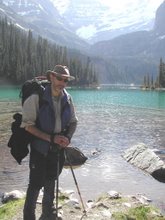There were a surprising number of responses to last
week’s post about the passing of my friend’s father. I guess I was a little
surprised by how that subject resonated with so many of my boomer friends, now
facing, or having recently faced, the imminent mortality of our parents. I feel
as if I preceded many of my peers in dealing with the decline and passing of my
parents, and I watch with great empathy as others cope with some of the
challenges we all face. One thing we all seem to share in this complicated
phase of our lives is the number of times we mutter to ourselves, “I didn’t see
that coming.”
A few weeks ago, “Silver Lake” Joe Thompson, host of
the live show that airs shortly before my radio show Thursday nights, asked me
if I would fill in and guest host for him this past week. He was taking his dad
back to his homeland in Northern Ireland for a visit. They’d been there not too
long ago, but Joe’s dad couldn’t recall the trip, because he has dementia. When
he realized that he had forgotten the trip he was assured he had made, Joe’s dad
asked if perhaps he could go back again. Maybe he won’t remember this trip
either, but I suspect that Joe felt this might be the last time he would be
well enough to make the journey, so he arranged to do everything, again. I was
moved by the gesture, and I think about all the other friends I know who are on
their own unique journey with their parents.
My dad and I were like oil and water when I was
growing up. He was well into his 40s when I was born, and we gave each other a
pretty hard time. I was a difficult teenager, and I regret the valuable time
lost before I got to know my dad. Thankfully, our relationship improved considerably
over the years, especially after I started working in the family business, and we
developed a strong mutual respect. The final stage of our journey as father and son
was when he and mom needed assistance in old age. It is a seismic change in our
duties as children, when we take on the task of assisting our parents in old
age. It’s all complicated by issues of pride, independence, role reversal, and
a hundred other mind-boggling variables that affect every family differently. While
my journey with my mom and dad is over, I can empathize with the spiritual
struggles my friends face as they tend to end stages of the ones they love.
I was touched when I heard Joe was taking
his dad back to Ireland, perhaps for the last time (perhaps not). Last week, a
friend responded to my report, by saying that a day doesn’t go by when he doesn’t
think about his parents, gone these many years. One thing I can say is that I
let both of mine know how much I loved them before they passed. The love you
give is equal to the love you take. It's all we really have in the end, isn't it? There was a photo Joe posted on Facebook the
other day, and it was of his father, with a serene look on his face, eyes
closed, basking in the sun somewhere near the northern tip of Northern Ireland.
The caption read “Daddy-O at the Causeway”, and It made me smile. I have a few of
those photographs tucked away in my mind as well. Joe, it looks like you’ve turned out
to be a pretty good son. Enjoy the ride my friend.
- Written by Jamie Oppenheimer c 2018 ALL
RIGHTS RESERVED






